イベント&アクティビティ
Review of special issue on Max Weber by Yufei Zhou
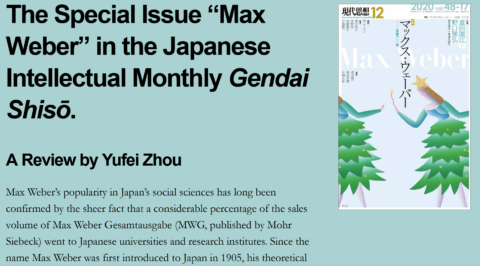
Max Weber’s popularity in Japan remains unbroken. To mark the 100th anniversary of his death, the prestigious intellectual journal Gendai Shisō (現代思想) has published a special issue (12/2020) dedicated to his works and intellectual influence. Leading Japanese intellectuals and Weber scholars have contributed 24 essays to this issue, including Mishima Ken’ichi (“Disenchantment Reconsidered”), Suzuki Masahiro (“Weber in Contemporary Chinese Thought”), and Konno Hajime (“Imagining Max Weber as a Prophet”). For the Max Weber Foundation’s blog “Max Weber in der Welt”, our Senior Research Fellow and historian Yufei Zhou has written a detailed review of this special issue which introduces the individual contributions.
First issue of electronic DIJ Newsletter published
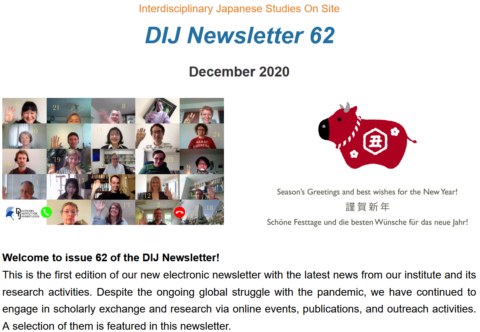
After 23 years, the DIJ has replaced its print edition of the DIJ Newsletter with a new, email format. Most sections from our print version remain but we have also added some new ones, such as ‘DIJ in the Media’, ‘Alumni News’, and ‘Social Media’. The new format enables us to share more information on our recent research and publication activities with you more directly and more frequently. Also new in this issue: you will find links to information on our DIJ webpages in German, Japanese, and English whenever content in these languages is available. We hope you will enjoy exploring this new DIJ Newsletter and the selection of activities and output of the DIJ and its researchers during the past months.
If you would like to receive the next issue of our newsletter in your inbox, please subscribe here.
New Publication: Routledge Handbook of Contemporary Japan
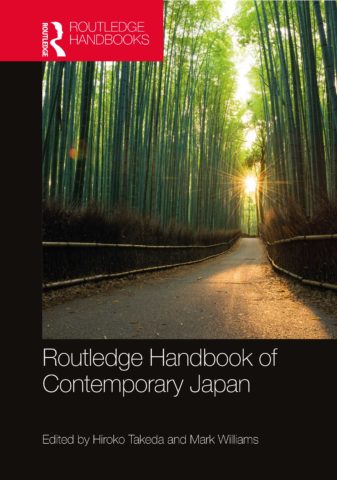
DIJ Director Franz Waldenberger has contributed the chapter “The Japanese Economy” to the recently published Routledge Handbook of Contemporary Japan, edited by Hiroko Takeda and Mark Williams. The chapter analyzes the development of the Japanese economy over the last 40 years. It covers the advantages of Japan’s institutional set-up in the 1980s, the burst of Japan’s ‘bubble economy’, the so-called ‘lost decades’ of low growth and recession as well as recent government initiatives to stimulate productivity growth with corporate governance and ‘work-style’ reforms. The chapter also contains an outlook on future developments. In addition to the challenges posed by the global pandemic, climate change, and digital transformation, they are characterized by unprecedented demographic change, a deflationary environment and huge government debt supported by an extreme expansion of the monetary base.
Handbook Studying Japan published
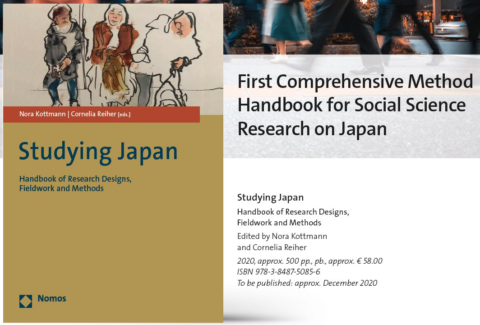
Studying Japan. Handbook of Research Designs, Fieldwork and Methods (Nomos 2020), edited by Nora Kottmann and Cornelia Reiher, is the first comprehensive guide to qualitative methods, research designs and fieldwork in social science research on Japan. More than 70 Japan scholars from around the world provide an easy-to-read overview of qualitative methods used in research on Japan’s society, politics, culture and history. The book covers the entire research process from the outset to the completion of a thesis, paper, or book. The authors give basic introductions to individual methods, discuss their experiences when applying these methods and highlight current trends in research on Japan. The authors include DIJ researchers Isaac Gagné, Sonja Ganseforth, Markus Heckel, Barbara Holthus, and Franz Waldenberger as well as DIJ alumni Verena Blechinger-Talcott, Steffen Heinrich, Carola Hommerich, Katharina Hülsmann, Hanno Jentzsch, Susanne Klien, Annette Schad-Seifert, Kai Schulze, Gabi Vogt, Cosima Wagner, Anna Wiemann, and Urs Matthias Zachmann. The book can be purchased from the publisher.
New DIJ Miscellanea The Digital Transformation published
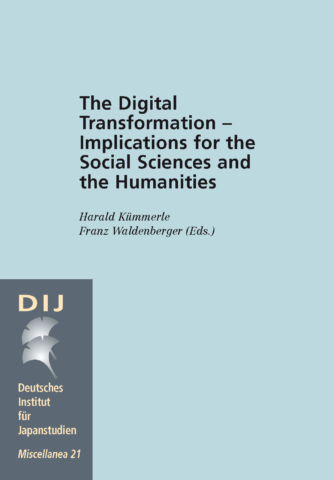 The term digital transformation (DT) has become omnipresent in our personal, social, economic, political, cultural, and academic lives. What are the implications of DT for the social sciences and humanities? This new volume of our DIJ Miscellanea series approaches DT by exploring technological developments and methodology, research data and infrastructure, new research objects and perspectives as well as shifting boundaries of the social sciences and humanities. The publication is the outcome of the workshop “The Digital Transformation – Implications for the Social Sciences and the Humanities” at the DIJ in September 2019. Co-organized by the Nippon Institute for Research Advancement (NIRA) and the German Centre for Research and Innovation Tokyo (DWIH), it brought together scholars from Japan and abroad. The volume consists of ten chapters, including one each by DIJ social scientist Susanne Brucksch (“Insights into the Digital Transformation From the Fields of Medicine and Healthcare in Japan”) and the co-editors Harald Kümmerle (“Postscript: Comparative and historical perspectives on the digital transformation”) and Franz Waldenberger (“Knowledge production and the role of SSH in the digital age”). It is available for free download here
The term digital transformation (DT) has become omnipresent in our personal, social, economic, political, cultural, and academic lives. What are the implications of DT for the social sciences and humanities? This new volume of our DIJ Miscellanea series approaches DT by exploring technological developments and methodology, research data and infrastructure, new research objects and perspectives as well as shifting boundaries of the social sciences and humanities. The publication is the outcome of the workshop “The Digital Transformation – Implications for the Social Sciences and the Humanities” at the DIJ in September 2019. Co-organized by the Nippon Institute for Research Advancement (NIRA) and the German Centre for Research and Innovation Tokyo (DWIH), it brought together scholars from Japan and abroad. The volume consists of ten chapters, including one each by DIJ social scientist Susanne Brucksch (“Insights into the Digital Transformation From the Fields of Medicine and Healthcare in Japan”) and the co-editors Harald Kümmerle (“Postscript: Comparative and historical perspectives on the digital transformation”) and Franz Waldenberger (“Knowledge production and the role of SSH in the digital age”). It is available for free download here
Issue 32(2) of Contemporary Japan published
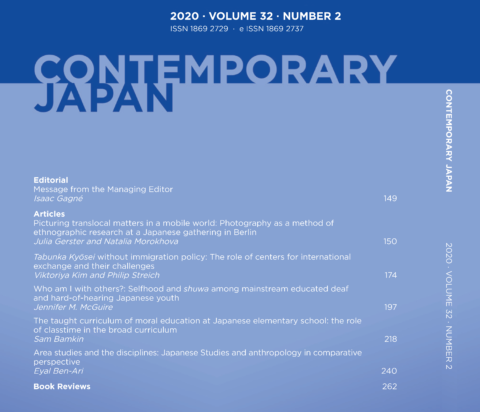
The latest issue of Contemporary Japan is now available online and in print. CJ32(2) features a range of articles exploring: photography and ethnographic research among Japanese in Berlin (Julia Gerster & Natalia Morokhova); the role of centers for international exchange in multicultural community building (Viktoriya Kim & Philip Streich); notions of selfhood among deaf and hard-of-hearing youth (Jennifer M. McGuire); and moral education in elementary school classrooms (Sam Bamkin). This issue also features an Invited Commentary by Eyal Ben-Ari reflecting on the relationship between area studies and the disciplines and the adaptive potential of Japanese Studies. Plus: five reviews of recently published books on the self-defense forces, food safety, gardening, memory in Hiroshima, and economic history. Please see the full issue here
Journal article on dislocation and social isolation in post-3.11 Japan

What happens when temporary shelters become permanent homes? What are the psychosocial impacts of prolonged dislocation, and how might these effects be mitigated through grassroots community activities? Based on fieldwork and interviews with residents in temporary housing and volunteer support groups in northeastern Japan, Isaac Gagné’s new article “Dislocation, Social Isolation, and the Politics of Recovery in Post-Disaster Japan” (Transcultural Psychiatry) analyzes the ongoing challenges of delayed recovery and chronic dislocation among survivors of the March 11, 2011 disaster in Japan. Focusing on Natori City, Miyagi Prefecture, Isaac examines how the complexity of the disaster-recovery process within the local politics of the region has produced new tensions, creating a particular “zoned liminality” for displaced residents while undermining the social nexus of community relations. The article also reflects on challenges in treating the psychosocial trauma among survivors, and how their needs are addressed through new citizen-based volunteer movements.
New book chapter on women in Düsseldorf’s food community
 A new book chapter by Nora Kottmann addresses life choices of Japanese women who live and work abroad. Focusing on women employed in Japanese culinary locales in a quarter called ‘Little Tokyo’ in the German city of Düsseldorf, it asks: Why do these women choose to work in the Japanese food service sector? What role do Düsseldorf’s Japanese community and the respective foodscape play in these women’s decision to move? Findings reveal that the choice of employment is mostly pragmatic and rarely the main reason for moving abroad. However, work in the food sector can serve as an opportunity to accomplish the dream of being in charge of one’s own life. The chapter “Japanese women on the move: Working in and (not) belonging to Düsseldorf’s Japanese (food) community” is part of the volume Food identities at Home and on the Move (edited by Raúl Matta, Charles-Édouard de Suremain, Chantal Crenn).
A new book chapter by Nora Kottmann addresses life choices of Japanese women who live and work abroad. Focusing on women employed in Japanese culinary locales in a quarter called ‘Little Tokyo’ in the German city of Düsseldorf, it asks: Why do these women choose to work in the Japanese food service sector? What role do Düsseldorf’s Japanese community and the respective foodscape play in these women’s decision to move? Findings reveal that the choice of employment is mostly pragmatic and rarely the main reason for moving abroad. However, work in the food sector can serve as an opportunity to accomplish the dream of being in charge of one’s own life. The chapter “Japanese women on the move: Working in and (not) belonging to Düsseldorf’s Japanese (food) community” is part of the volume Food identities at Home and on the Move (edited by Raúl Matta, Charles-Édouard de Suremain, Chantal Crenn).

















 Open Access
Open Access
